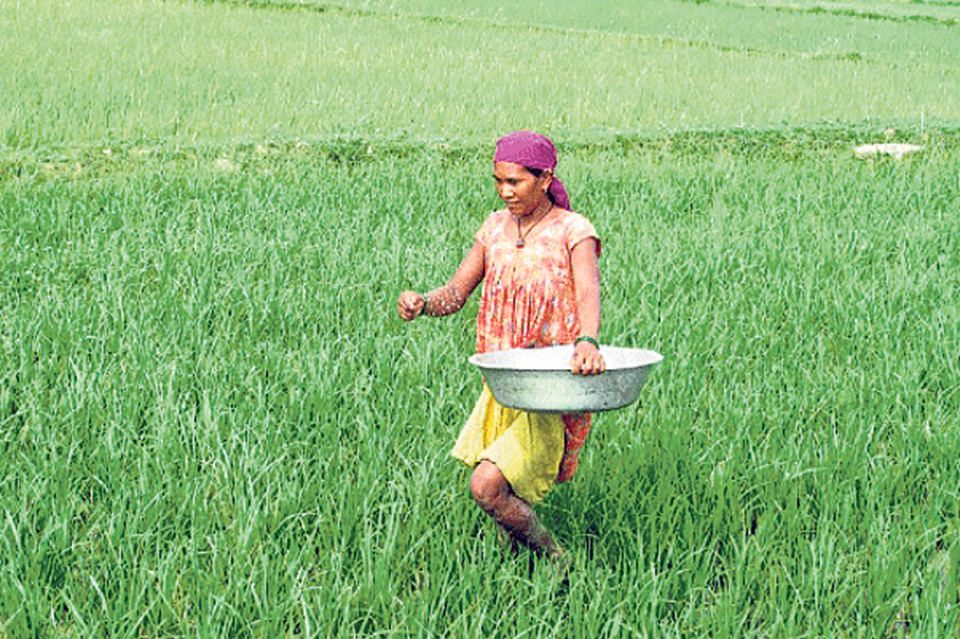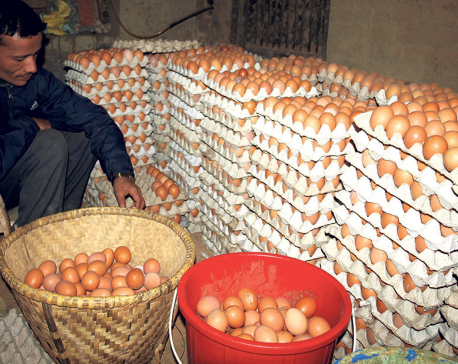
OR
Editorial
The Foolish Move to De-finance Farmers
Published On: February 22, 2023 07:36 AM NPT By: Republica | @RepublicaNepal

The decision by the Ministry of Finance (MoF) to discontinue financial subsidies to Nepali farmers is a catastrophic mistake that will undoubtedly further cripple the country's agricultural production. Despite the government's allocation of Rs 8.5 billion for agricultural self-sufficiency programs, the MoF has withheld Rs 8.457 billion of this amount, leaving Nepali farmers to bear the brunt of its imprudence. To make matters worse, the import of foreign agricultural products is on the rise, further exacerbating the plight of Nepali farmers. This shortsightedness is sure to have long-term ramifications for Nepal's agricultural sector.
Experts in the agricultural sector have expressed concerns that this move will harm agricultural production while increasing imports further. Officials at the Ministry of Agriculture and Livestock Development confirmed that the subsidy announced for the farmers at the local level under the government's agricultural program has been put on hold. This decision is disappointing for the farmers who were expecting an increase in budget allocation for agriculture.
The government's decision to cut the budget for agriculture is an egregious mistake, especially at a time when investment in this vital sector is already decreasing. That should be precisely why the government move has courted strong criticism from even the Municipal Association of Nepal (MuAN), the umbrella organization of municipalities and rural municipalities of the country. Indeed, the government was expected to provide relief to Nepali farmers and boost agricultural production but it has withheld the agriculture budget instead. It goes without saying that without adequate investment in agriculture, Nepal's reliance on imports cannot be reduced.
The government had allocated a budget of Rs 55.97 billion for the Ministry of Agriculture and Livestock Development in the current fiscal year. The budget was essential as it included financing programs to provide seeds, fertilizers, and technology and irrigation facilities to the farmers in a simple and easy way, through subsidized loans through microfinance. Expanding agricultural insurance and implementing it effectively, and building an agricultural produce collection center was also part of the plan. However, the recent decision to cut the agriculture budget has dealt a severe blow to these programs, and the consequences will be far-reaching. The farmers will bear the brunt of this decision, and the dream of achieving self-sufficiency in major crops and commodities will remain elusive. The government's lack of commitment to the agricultural sector and its programs is a cause for concern, and it will have significant implications for the country's economic growth and food security.
The policy of developing Nepal's rural areas as agricultural production centers, organizing farmers into agricultural cooperation groups and cooperatives, and utilizing the available arable land as well as barren land has not been effective. The country's dependence on imported agro products is increasing, and the absence of modernization, mechanization, and commercialization in agriculture is contributing to this problem. In the first five months of the current fiscal year, agricultural products worth around Rs 31.5 billion have been imported into the country. Out of the 4.0,48 million metric tons of rice consumed in Nepal, 3.180 million metric tons is produced domestically, while about 867,000 metric tons is imported from abroad. Vegetables and other food items are also being imported from abroad.
The government's goal of import substitution by increasing agricultural production every year has not been achieved, and the import of agricultural and animal products has doubled in the last five years. Although there has been some increase in investment in agriculture, the production of the main food crops has not increased. Nepal is importing a variety of food items, from rice to fish and meat, oil, onion, potato, and coriander, which used to/can be grown domestically with proper investment and support.
So, the discontinuation of financial subsidies to the farmers is a grievous error that will have severe consequences for the agricultural sector. The government's shortsightedness and lack of foresight in this matter are deeply concerning, and it is imperative that they rectify this misstep immediately.
It is the need of the hour for the government to allocate substantial funds to support agricultural production and reduce the country's reliance on food imports. This move will not only boost the farmers' morale but also pave the way for a self-reliant and prosperous economy. The importance of the agricultural sector cannot be overstated, and it is incumbent upon the government to take the necessary steps to safeguard it.
You May Like This

Lack of market troubles potato farmers in Jumla
JUMLA, Feb 17: Potato farmers of Patarasi Rural Municipality in Jumla district are worried as their produce is not getting market... Read More...

Poultry farmers shift to other professions as shortage of chicks lingers
BANEPA, August 27: Poultry farmers in Kavre have been facing shortage of layers chicks. Bachhuram Thapa of Setidevi Poultry Farm at... Read More...

Materials worth Rs 20 million distributed to farmers
DOLAKHA, April 6: Rural Development Tuki Sangh, Dolakha and Local Initiative for Biodiversity, Research and Development (LIBIRD), Dolakha distributed materials... Read More...





Just In
- Fugitive arrested after 26 years
- Indian Potash Ltd secures contract to bring 30,000 tons of urea within 107 days
- CAN adds four players to squad for T20 series against West Indies 'A'
- ‘Precast' technology introduced in the construction of bridges along Muglin-Pokhara road
- Leopard attack injures young man in Kanchanpur
- SC rejects writ petition filed against Home Minister Lamichhane
- Nepal and China sign two agreements in the presence of Finance Minister Pun
- Pun released on bail in Supreme Cooperative fraud case














Leave A Comment